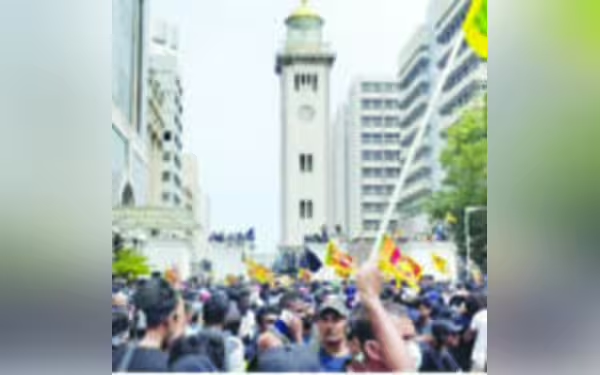Saturday, September 28, 2024 10:22 PM
Anura Dissanayake: Sri Lanka's First Leftist President
- Dissanayake's election marks a political turning point.
- Economic crisis poses significant challenges ahead.
- Public expectations are high for anti-corruption measures.
 Image Credits: pakistantoday
Image Credits: pakistantodayAnura Dissanayake's election as Sri Lanka's first leftist president brings hope amid economic turmoil and high public expectations.
The recent election of Anura Dissanayake as Sri Lanka’s first leftist President has ushered in a new political era for the nation. This significant event marks a turning point in the country’s political landscape, raising numerous questions about the future direction of Sri Lanka under his leadership. With pressing issues such as economic crisis, debt, unemployment, and foreign relations at the forefront, Dissanayake's presidency is poised to be a critical period for the island nation.
Having led the coalition of Janatha Vimukthi Peramuna (JVP) and the National People’s Power (NPP) to a remarkable victory, Dissanayake has emerged from a party that previously held only three seats in the 225-member parliament. His ascent to the highest office reflects the deep-seated frustrations of the Sri Lankan populace, who have long endured social and economic hardships. During his campaign, he made bold promises to dismantle the entrenched political system and eradicate corruption, positioning himself as a representative of the people against the dynastic politics that have dominated the country.
In a historic first, the presidential election required a second count, as no candidate achieved the necessary 50 percent of the vote in the initial tally. Dissanayake secured 42.31 percent, while his main opponent, Sajith Premadasa, received 32.76 percent. The second count, conducted under a preferential ballot system, ultimately led to Dissanayake's victory, marking a significant milestone in Sri Lanka’s electoral history.
However, Dissanayake's presidency comes at a time when Sri Lanka's economy is in turmoil. The country defaulted on its debt in 2022, with foreign reserves depleted and national debt exceeding $83 billion. Inflation skyrocketed to nearly 70 percent, leading to widespread public discontent and a popular uprising. Dissanayake's foremost challenge will be to navigate this economic disaster. The current government has accepted a $2.9 billion bailout package from the International Monetary Fund (IMF), with plans to begin debt repayments in 2028. Dissanayake has expressed his intention to continue this process and renegotiate economic policies with the IMF, but uncertainty looms over how he will manage this burden and guide the country toward recovery.
With only three seats in Parliament, Dissanayake's JVP cannot govern independently. One of his immediate tasks will be to call for a general election. If his party and coalition can secure more seats, he will be better positioned to form a stable government. Currently, 222 members from other parties dominate Parliament, raising concerns about the level of support he will receive. Dissanayake has already announced plans to dissolve the current assembly, arguing that it does not reflect the people's aspirations. However, if opposition parties do not cooperate, governance may be disrupted, leading to renewed political instability.
International relations, particularly with India, will also be a focal point of Dissanayake's presidency. Given Sri Lanka's geographical proximity and historical ties with India, his foreign policy will be crucial. Despite his leftist ideology, it is likely that Dissanayake will strive to maintain positive relations with India, especially considering the assistance India provided during Sri Lanka's economic crisis. Balancing relations with both India and China will be a delicate task, as leaning too heavily towards one could strain ties with the other.
Public expectations are high following Dissanayake's election. He has vowed to combat corruption and advocate for marginalized communities within Sri Lankan society. However, there is a notable contrast between the JVP's previous armed struggles and the current democratic governance system. The people are now eager to see how effectively he can fulfill his promises and lead the nation out of its economic collapse.
While this new chapter in Sri Lankan politics brings hope, it is accompanied by significant uncertainties. Dissanayake's ability to address the economic crisis, manage debt repayment, and navigate international relations will be pivotal for the future of Sri Lanka. As the nation watches closely, the success of his leadership will ultimately depend on his capacity to unite the country and restore stability in these challenging times.













